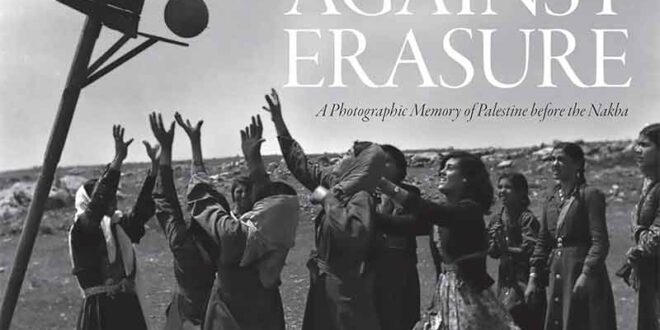Against Erasure (Haymarket Books) is a book, edited by Teresa Aranguren and Sandra Barrilaro, that presents a pictorial history of Palestinians. The photos refute the often-heard canard that Palestine was a land without people. More importantly, the historicity of the photos humanizes the Palestinians. It seems ludicrous to anyone familiar with Palestinians that they would require humanization. Nonetheless, the humanity of Palestinians is denied by many prominent Israeli Jews.
Take, for instance, Israeli defense minister Yoav Gallant who besmirched Palestinians as “human animals.” Jerusalem deputy mayor Arieh King upped the ante, stating that Palestinians are not “human animals”; they are not “human beings”; they are “subhuman.”
Such quotations by Israeli officials are serial and nothing new. [1]
Following the rescindment of the British Mandate, the United Nations forced partition upon the Indigenous people of historical Palestine. The outcome birthed the Jewish State of Israel. The land allotted to the Palestinians had its sovereignty in limbo. Palestine was, as evidenced by decades without formal statehood recognition by the United Nations, a de jure non-state. It was, however, conferred “observer entity” by the UN General Assembly in 1974. That status was upped to a “non-member observer state” in 2012 by a 138-9 UN General Assembly vote, and that is the situation today.
The sovereignty question, however, pales in significance to the genocidal onslaught that Israel is carrying out in Palestine.
“Thanks to the shameful indifference of the West and the international community, the Nakba of 1948 has become a permanent Nakba,” lamented Bichara Khader, a professor at the Catholic University of Leuven. (p 14)
It seems permanent in the mind of Israeli prime minister Binyamin Netanyahu who said in Hebrew: “They [the Israeli troops] are committed to completely eliminating this evil from the world.” He then added: “You must remember what Amalek has done to you, says our Holy Bible. And we do remember.”
The god of the Bible had commanded the Hebrews to carry out a genocide: “Now go and smite Amalek, and utterly destroy all that they have, and spare them not; but slay both man and woman, infant and suckling, ox and sheep, camel and ass.” (1 Shmuel/Samuel 15:3)
The message according to Mother Jones: “The lesson, when read literally, is clear: Saul’s failure to kill every Amalekite posed an existential threat to the Jewish people.”
Khader termed the Nakba a sociocide. This was made clear by the Zionist movement’s stated intention
… to establish a Jewish state in Palestine—which clearly and emphatically meant the “de-Arabization” of Palestine or, in other words, the “invisibilization” of its people to facilitate the Judaization of the country.
The early twentieth century propaganda slogan “a land without a people for a people without a land” represents the hard nucleus of Zionist ideology. (p 8)The malevolence of the Nakba has been laid bare during the current Israeli onslaught where 20,000 Palestinians (70% percent women and children) have been murdered by Zionist Jews. It must be noted that it is not a minuscule sect of Israeli Jewry. It is a military incursion into Gaza supported by more than 90 percent of Israeli Jews. It is abetted by the United States with the acquiescence of many western countries, and it is being carried out before the eyes of much of the world.
Back in 2014 when Israel was bombing Gaza, Israeli Jews in the nearby town of Sderot would bring out their sofas and chairs to sit and cheer the destruction, rather gleefully as the Buzzfeed News headline made clear: “Israelis Seen Clapping And Eating Popcorn While Watching Bombs Drop On Gaza.”
Photos posted on Twitter (now X) by Danish Middle East correspondent Allan Sørensen prompted outrage at Israeli inhumanity by many commenters.
Aliya Nazki: “I’m sorry but people, any people, celebrating death anywhere is abominable.”
Syed-Makki Shah: “morality of a people so skewed that murder is a public spectle. [sic] an astonishing thing to see in this day/age?”
It would seem obvious that the inhumanity is an attribute embraced by a plurality of a people who seemingly internalized a perverse lesson from World War II.
Nonetheless, the historical collection of photos of Palestinians and the presentation their lives is an irrefutable testimony to the humanity of these people. Recognize the diversity among them. There are minorities such as the Bedouins, Druze, and also Jews.
The Palestinians are mothers, fathers, children; they have families. They jubilate at weddings and mourn at funerals. The farmers grow olives, oranges, and melons. They are fishermen, police, seamstresses, musicians, teachers, postal workers, crafts people, engineers, boatmen, stevedores, doctors, nurses, shopkeepers, and politicians. The existence of organized political institutions attests to indigenous administration despite Ottoman, British, and Israeli attempts to quash Palestinian self-government and sovereignty.
Gaze at the photos and see Palestinians at the bazaar, at work, in school, in boy-scout troops. They play basketball, soccer, and swim. The Palestinian transportation network allowed them to travel by car, train, plane, and boat. They attended churches and mosques. For leisure they’d go on picnics, watch open-air cinema, listen to Palestinian orchestras, eat in restaurants, and go to the beach.
Palestinians have all the trappings of what constitutes humanity. The photos in Against Erasure bring forth that Palestinians are humans like us. The humanity of Palestinians ought to have been unquestionable for everyone, and for those who doubted this, give your head a hard shake. But as they say: better late than never. If you are curious about what Palestinians were like before the Nakba, before the 2014 Gaza massacres, and before the current Israeli genocide or, more importantly, if for some peculiar reason, you need further affirmation of Palestinian humanity get Against Erasure and humanize yourself.
ENDNOTE:1 See Kim Petersen and BJ Sabri, “Defining Israeli Zionist Racism,” Dissident Voice, in particular parts 8, 9, and 10.
 Eurasia Press & News
Eurasia Press & News




